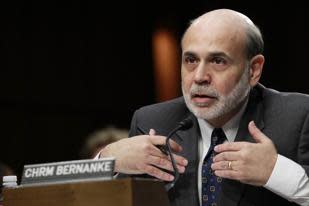How Ben Bernanke Cost Me $53,000
I thought Ben Bernanke was my friend. For the past year or so, I’ve been shopping for a house, grateful that the Federal Reserve had pushed interest rates to record lows. The lower monthly payments would help me qualify for a loan and buy a place I wouldn’t have been able to afford just a few years ago.

Then, on May 22, the Fed Chairman turned on me. Bernanke told a Congressional committee that the Fed might change its policies during the next few months, which would push interest rates up — and abruptly end the honeymoon for homebuyers.
Financial markets have been manic ever since, with interest rates shooting up by nearly three-quarters of a point in just one month. Had Bernanke let me know this was coming, I’d be much better off today. In late April I found a house I plan to buy, and in early May I had the chance to lock in a 30-year mortgage rate of 3.5%. I declined, reasoning that rates were more likely to fall than rise. I was wrong, and getting stuck with a higher rate will cost me about $53,000 over the course of a 30-year mortgage.
Taking a risk
As interest rates rose, it felt fun for a while to be playing the markets and taking a risk. Then I felt panicky and started waking up in the middle of the night wondering how much money I’d end up losing on the gamble. Maybe I should even try to wriggle out of the whole deal, I told myself. I gave up hope of getting anything lower than a 3.5% rate, then realized I’d be lucky to get 4%. With time running out before my mortgage would be finalized, I finally locked in at a fixed rate of 4.125%.

For me, the monthly payment on a mortgage at 4.125% will be $148.11 higher than it would be at 3.5%. Add that up over the 30-year duration of the loan, and it totals $53,319.60. That’s a full year of private college, a BMW 335i convertible or a Starbucks (SBUX) latte every day for 29 years.
Gambling on a drop in rates was logical at the time. The federal spending cuts known as the sequester were about to kick in; this was expected to depress hiring and GDP growth. For the past five years, signs of trouble in the economy have typically prompted investors to put their money into “safe” investments such as long-term Treasury securities, which pushed interest rates down as demand went up. If the pattern held, sequester worries, plus the usual litany of problems in Europe and elsewhere, would draw money out of stocks and into bonds, pushing rates lower.
[Related: Find Mortgage Rates in Your Area]
The pattern, however, didn’t hold. The sequester might still ding the economy, but it’s having a delayed effect. Meanwhile, other global crises we’ve been able to count on to rattle investors and send them scrambling for safety suddenly seem less scary. Greece might stay in the euro zone after all. New U.S. energy production lessens the odds of a Middle East energy shock. Cyprus? Never heard of it.
The Fed has always said it would scale back its aggressive easy-money policies — especially quantitative easing, which drives down interest rates through huge purchases of bonds — once the economy got strong enough to stand on its own. Bernanke apparently thinks it’s getting closer to that point. In his May testimony he said the Fed could “take a step down” in its bond purchases soon, if new data show sustained improvements in the job market. That seemed like a statement of the obvious, especially since Bernanke qualified it with plenty of ifs.
But global investors thought they detected a looming pivot in Fed policy, which might mean rates would rise sooner than expected. So a bond selloff began, and it gathered steam as reports on hiring and other indicators came in relatively strong, making it more likely the Fed would start to tighten its policies.
Getting ready for the exit
The Fed still hasn’t changed anything, but everybody wants to be out of their chairs and close to the exit when it actually happens, which has fueled the bond selloff. Developments in Japan, China and Europe have contributed to the mania, yet everybody knows that Bernanke remains the most important economic policymaker on the planet, and he hasn’t said anything since May 22 to calm markets or clarify his intent. Wednesday's eagerly anticipated presser following the two-day FOMC meeting may bring more clarity to investors — or it may not.
I knew interest rates could rise this year; I just didn’t think it would happen this soon. Bernanke has made a big deal out of making the Fed more transparent and telegraphing its moves so investors don’t freak out. Maybe he defines transparency differently than I do.
Snarky commentators sometimes refer to the hirsute (though bald) Bernanke as The Beard, which I’ve always found vaguely disrespectful. But to me now, Bernanke has also become The Beard, as if he’s a shady character in a James Bond movie. With a personal stake in every word he utters, I’ve become more apt to detect a sinister edge to his machinations. The Beard, master of markets, must have deliberately raised the out-of-pocket costs to me and millions of other borrowers, lest we overspend and create new bubbles. Had he asked me, I would have promised to be careful with my money and not fuel any bubbles.
Aside from the psychological pain of watching my money slip away every day interest rates ticked up, I’m sanguine about the risk I took. It was a “trade,” in Wall Street parlance. You win some trades and you lose some. But I made a couple of mistakes. First, I may have been guilty of “confirmation bias,” because I wanted to believe rates would go down, so I sought evidence that would support my preferred outcome instead of considering all evidence. Second, I assumed past results would predict future performance, which left me trapped when market dynamics changed.
I still got a good deal by historical standards, since the typical mortgage rate over time has averaged around 7%. But that’s not the usual basis of comparison for anybody shopping for a home these days. Most buyers will simply ask what they can afford, and whether a home purchase today seems like a good deal compared with what it was yesterday and what it might be tomorrow. By that standard, homes are getting considerably more expensive, while the unemployment rate is still high and the overall economy is weak. Bernanke probably knows what he's doing, but it sure wouldn’t hurt if he filled in the rest of us.
Rick Newman’s latest book is Rebounders: How Winners Pivot From Setback To Success. Follow him on Twitter: @rickjnewman.

